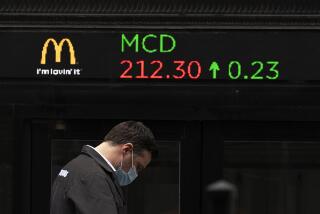What Are ‘T Plus 3’ Ramifications?
- Share via
Q. I have an account with a discount broker but hold my own stock certificates. With the advent of “T plus 3” transaction settlement rules, I’m thinking that I should let my broker hold the shares in street name. What are the ramifications of this? Will I still get my dividend checks? How? May I still participate in dividend reinvestment programs? What about insurance coverage in the event something happens to the brokerage’s business? Am I covered if they hold the shares? What are the disadvantages of holding the certificates myself in a safe deposit box? -- N.E.L.
*
A. You are correct in realizing that the new rules requiring proceeds from stock transactions to change hands within three working days, down from the previous limit of five, reduces the appeal of holding your own certificates. And this is the exact conclusion the brokerage industry wants you to reach. Over the last several years, the industry has steadily pushed its clients into holding their stocks in “street name,” in the name of the brokerage. In fact, many, if not all brokerages by now, charge clients at least $15 for stock certificates.
Should you be concerned about this? Probably not in the least. Assuming you are dealing with a strong and reputable brokerage, allowing your broker to hold your stock in street name is at least as safe, and arguably even safer, than holding on to your own certificates. It is certainly far more convenient, especially with the advent of “T plus 3” settlement rules since you will not face the hassle of making sure that you get your certificate to your broker within three days of a sale.
Brokerages generally carry insurance from the Securities Investor Protection Corp., which insures each trading account held in the brokerage’s name for up to $500,000. In addition, many brokerages carry additional insurance on their own. For example, Charles Schwab, the nation’s largest discount brokerage, insures each account for an additional $49.5 million, bringing the total amount of available insurance to $50 million per account. (However, be advised: This insurance only applies to your account value when a brokerage fails; it does not cover poor investment decisions or fluctuations in the market.
Some investors would argue that holding your stock in street name relieves you of the responsibility for the safety of your certificates. (How many of us really keep good records and are faithful about storing important documents in safe deposit boxes?)
Converting your holdings to street name will not at all affect your participation in dividend reinvestment programs or your timely receipt of dividend checks. In fact, it could help. If you participate in dividend reinvestment programs now, that will continue unchanged. Further, some brokerages will offer you the chance to reinvest your dividends in additional shares without paying a commission. (Schwab, for example, will reinvest your dividends in any publicly traded U.S. corporation without fee.) Finally, if you currently receive dividend checks, you can instruct your broker to mail them to you or deposit them in your cash account at the brokerage.
If you decide to convert your portfolio to street name, all you have to do is take your certificates to your broker and enroll. It is no more difficult that that.
Do Taxes Paid on Cash Dividends Raise Basis?
Q. Is it true that taxes paid on reinvested dividends increase the tax basis of a stock? Further, if this is correct, do the taxes paid on cash dividends also increase the basis? If not, why? -- F.C.M .
*
A. It is not, per se, true that taxes paid on reinvested dividends increase a shareholder’s tax basis in the stock. However, in a sense it can work out that way. Why? You will understand when we explain what’s really going on.
Buying shares with cash dividends is the same as buying more shares with any other after-tax cash income. The purchase price is your tax basis. Hence, the purchase price each quarter becomes the tax basis of the shares purchased with that quarterly dividend. It doesn’t matter whether the purchases are discounted or part of a stock reinvestment program. (However, if the declared dividend is issued directly in the form of shares and not cash, in most cases your tax basis is zero and you do not need to pay taxes until the shares are sold.)
If you sell all your shares at one time, you can determine your tax liability by adding together all the funds you have invested in the shares--both at the initial purchase and each quarterly dividend reinvestment--to compute your average tax basis. If you sell only some shares, the tax treatment choices get more complicated.
Now, assuming that the value of the stock you hold has steadily increased in value, each purchase you have made has cost you a little more. Therefore your average tax basis in the total investment will have risen. However, if the value of your stock fell as you purchased additional shares, your average tax basis in the shares would correspondingly drop.
The point is that taxes paid on reinvested dividends establish the tax basis of the shares purchased with those dividends. This leads nicely to your second question: whether simply paying taxes on dividends increases the tax basis in the shares generating those dividends. It does not.
Carla Lazzareschi cannot answer mail individually but will respond in this column to financial questions of general interest. Please do not telephone. Write to Money Talk, Business Section, Los Angeles Times, Times Mirror Square, Los Angeles, CA 90053 Or send e-mail to carla.lazzareschi@latimes.com
More to Read
Inside the business of entertainment
The Wide Shot brings you news, analysis and insights on everything from streaming wars to production — and what it all means for the future.
You may occasionally receive promotional content from the Los Angeles Times.










